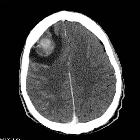choriocarcinoma








Choriocarcinoma is an aggressive, highly vascular tumor. When it is associated with gestation, it is often considered part of the spectrum of gestational trophoblastic disease; it is then termed gestational choriocarcinoma. When it occurs in the absence of preceding gestation, it is termed non-gestational choriocarcinoma (these occur most often in the ovary or testis).
Epidemiology
Depends on the site of origin of the tumor. In females, it may occur during or outside of pregnancy; non-gestational choriocarcinoma of the ovary typically occurs in prepubertal girls and postmenopausal women. Testicular choriocarcinomas usually present in male patients between ages 15 and 30 .
Pathology
In the classic case of gestational choriocarcinoma, the tumor is derived from chorionic epithelium.
Location
Typically arises in association with reproductive organs:
- uterus: choriocarcinoma of the uterus
- cervix
- ovary: choriocarcinoma of the ovary
- testes: testicular choriocarcinoma
Primary occurrence outside the reproductive system has been reported but is extremely rare. Such sites include:
- brain: primary intracranial choriocarcinoma
- lung: primary pulmonary choriocarcinoma (PPC)
- pulmonary arteries
- stomach
- the small intestine
- pancreas
Trophoblastic cells have an affinity for blood vessels and therefore the tumors have a tendency to metastasize through the haematogenous route.
Choriocarcinoma is one of the causes of cannonball metastases to the lungs.
Markers
High levels of βhCG are usually seen in cases of choriocarcinoma.
Radiographic features
Imaging features of a primary tumor are dependent on location: see individual subtypes under "location" above.
Treatment and prognosis
The tumor is aggressive in its behavior and metastases are frequent, with the lungs being a common site of metastasis. Despite its aggressiveness, it is generally highly chemosensitive and carries a much better cure rate than other comparable malignancies.
Complications
A significant proportion of the complications arises from hemorrhage due to high vascularity in either a primary tumor or its metastases.
Siehe auch:
- gestational trophoblastic disease
- gestational choriocarcinoma
- testicular choriocarcinoma
- non-gestational choriocarcinoma
- primary intracranial choriocarcinoma
- primär pulmonales Chorionkarzinom
- mediastinal choriocarcinoma
- Chorionkarzinom des Ovars
- Chorionkarzinom des Uterus
- reines primäres Chorionkarzinom des Ovars
und weiter:
- hypervaskularisierte Leberläsionen
- Pinealiszyste
- Tumoren des vorderen oberen Mediastinums
- Keimzelltumor
- Hodentumoren
- ultrasound appearances of liver metastases
- complete mole
- differential diagnosis of calcified pulmonary densities
- mediastinale Keimzelltumoren
- intracranial choriocarcinoma
- germ cell tumour classification
- chorioadenoma destruens
- maligne Neoplasien des Hodens
- classification of germ cell tumours
- non gestational choriocarcinoma
- Neoplastic intracranial aneurysm
- gynäkologisch radiologisches Curriculum
- nichtseminomatöser Keimzelltumor
- Lungenmetastasen bei Chorionkarzinom
- eingeblutete Metastasen
- Germinom des ZNS
- intrakranieller Keimzelltumor
- Merkspruch Keimzelltumoren
- intracranial germ cell tumours
- Chorionkarzinom Staging

 Assoziationen und Differentialdiagnosen zu Chorionkarzinom:
Assoziationen und Differentialdiagnosen zu Chorionkarzinom:

